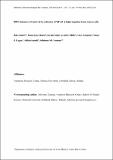| dc.contributor.author | Jaafar, Rola | |
| dc.contributor.author | Mnich, Katarzyna | |
| dc.contributor.author | Dolan, Sarah | |
| dc.contributor.author | Hillis, Jennifer | |
| dc.contributor.author | Almanza, Aitor | |
| dc.contributor.author | Logue, Susan E. | |
| dc.contributor.author | Samali, Afshin | |
| dc.contributor.author | Gorman, Adrienne M. | |
| dc.date.accessioned | 2018-05-23T09:19:51Z | |
| dc.date.issued | 2018-02-06 | |
| dc.identifier.citation | Jaafar, R., Mnich, K., Dolan, S., Hillis, J., Almanza, A., Logue, S. E.,Samali, A., Gorman, A. M. (2018). RIP2 enhances cell survival by activation of NF-ĸB in triple negative breast cancer cells. Biochemical and Biophysical Research Communications, 497(1), 115-121. doi: https://doi.org/10.1016/j.bbrc.2018.02.034 | en_IE |
| dc.identifier.issn | 1090-2104 | |
| dc.identifier.uri | http://hdl.handle.net/10379/7372 | |
| dc.description.abstract | Receptor-interacting protein 2 (RIP2) is an essential mediator of inflammation and innate immunity, but little is known about its role outside the immune system. Recently, RIP2 has been linked to chemoresistance of triple negative breast cancer (TNBC), the most aggressive breast cancer subtype for which there is an urgent need for targeted therapies. In this study we show that high expression of RIP2 in breast tumors correlates with a worse prognosis and a higher risk of recurrence. We also demonstrate that RIP2 confers TNBC cell resistance against paclitaxel and ceramide-induced apoptosis. Over expression of RIP2 lead to NF-kappa B activation, which contributed to higher expression of pro-survival proteins and cell survival. Conversely, RIP2 knockdown inhibited NF-kappa B signaling, reduced levels of anti-apoptotic proteins and sensitized cells to drug treatment. Together, these data show that RIP2 promotes survival of breast cancer cells through NF-kappa B activation and that targeting RIP2 may be therapeutically beneficial for treatment of TNBC. (C) 2018 Published by Elsevier Inc. | en_IE |
| dc.description.sponsorship | We thank the following for kindly providing plasmids: Dr. J.V. McCarthy, University College Cork, Ireland for the plasmid expressing WT RIP2, Prof. J. Tschopp, University of Lausanne, Switzerland for the DN RIP2 plasmid, and Dr. A. Ryan, NUI Galway for the NF-κB super-repressor plasmid. The work in our group is funded by Breast Cancer Now (formerly Breast Cancer Campaign, grant numbers 2010NovPR13, 2008NovPhD21 and 2015MaySP550), Health Research Board (grant number HRA-POR-2014-643), Belgium Grant (IAP 7/32), a Science Foundation Ireland grant co-funded under the European Regional Development Fund (grant Number 13/RC/2073) and EU H2020MSCA ETN-675448 (TRAINERS), MSCA-RISE-2016-734749 (INSPIRED), the Irish Research Council (RS/2012/255 and GOIPD/2014/53), Clinical Research Development Ireland (formerly Molecular Medicine Ireland, Clinical and Translational Research Scholars Programme), Enterprise Ireland (IP 2016 0510), Science Foundation Ireland Starting Investigator Research Grant (15/SIRG/3528), Thomas Crawford Hayes Fund (NUI Galway) and College of Science, NUI Galway. | en_IE |
| dc.format | application/pdf | en_IE |
| dc.language.iso | en | en_IE |
| dc.publisher | Elsevier | en_IE |
| dc.relation.ispartof | Biochemical And Biophysical Research Communications | en |
| dc.rights | Attribution-NonCommercial-NoDerivs 3.0 Ireland | |
| dc.rights.uri | https://creativecommons.org/licenses/by-nc-nd/3.0/ie/ | |
| dc.subject | Apoptosis | en_IE |
| dc.subject | NF-kappa B (Nuclear Factor kappa-light-chain-enhancer of activated B cells) | en_IE |
| dc.subject | RIP2 (Receptor-interacting serine-threonine kinase-2) | en_IE |
| dc.subject | TNBC (Triple negative breast cancer) | en_IE |
| dc.subject | IMMUNE-RESPONSES | en_IE |
| dc.subject | KINASE-ACTIVITY | en_IE |
| dc.subject | RECEPTOR | en_IE |
| dc.title | RIP2 enhances cell survival by activation of NF-ĸB in triple negative breast cancer cells | en_IE |
| dc.type | Article | en_IE |
| dc.date.updated | 2018-05-23T08:43:59Z | |
| dc.identifier.doi | 10.1016/j.bbrc.2018.02.034 | |
| dc.local.publishedsource | https://doi.org/10.1016/j.bbrc.2018.02.034 | en_IE |
| dc.description.peer-reviewed | peer-reviewed | |
| dc.contributor.funder | Breast Cancer Now | en_IE |
| dc.contributor.funder | Health Research Board | en_IE |
| dc.contributor.funder | Belgium Grant | en_IE |
| dc.contributor.funder | Science Foundation Ireland | en_IE |
| dc.contributor.funder | Irish Research Council | en_IE |
| dc.contributor.funder | Clinical Research Development Ireland | en_IE |
| dc.contributor.funder | Enterprise Ireland | en_IE |
| dc.contributor.funder | College of Science, NUI Galway | en_IE |
| dc.contributor.funder | Thomas Crawford Hayes Fund, NUI Galway | en_IE |
| dc.description.embargo | 2019-02-06 | |
| dc.internal.rssid | 14208437 | |
| dc.local.contact | Adrienne Gorman, Biochemistry, School Of Natural Science, Bioresearch Building, Nui. 2417 Email: adrienne.gorman@nuigalway.ie | |
| dc.local.copyrightchecked | Yes | |
| dc.local.version | ACCEPTED | |
| dcterms.project | info:eu-repo/grantAgreement/SFI/SFI Research Centres/13/RC/2073/IE/C�RAM - Centre for Research in Medical Devices/ | |
| dcterms.project | info:eu-repo/grantAgreement/EC/H2020::MSCA-ITN-ETN/675448/EU/Endoplasmic Reticulum Stress in Health and Disease/TRAIN-ERS | |
| dcterms.project | info:eu-repo/grantAgreement/EC/H2020::MSCA-RISE/734749/EU/Targeting IRE1 in disease/INSPIRED | |
| nui.item.downloads | 554 | |


